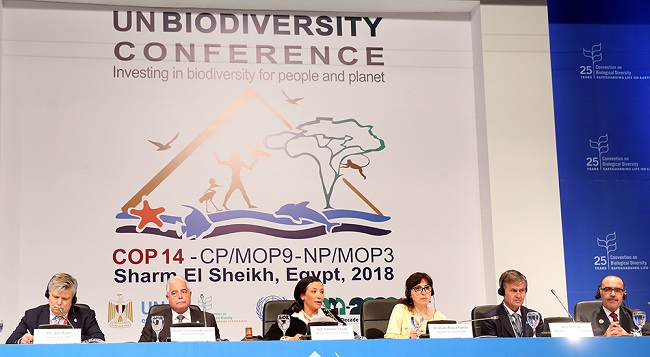The 2018 UN Biodiversity Conference opened on Saturday, November 17, 2018 in the seaside town of Sharm el-Sheikh, Egypt with an opening ceremony that included an address from President of Egypt, Abdel Fattah Saeed Hussein Khalil el-Sisi, who emphasised the crucial importance of the meeting for Egypt, and for global efforts for sustainable development.

Only two years remain in the commitment period for the Strategic Plan for Biodiversity 2011-2020. Over the next two weeks, governments will be urged to ramp up their ambitions and actions to achieve action on the 20 targets they established in Nagoya, Japan in 2010.
At this year’s conference, national governments, regional organisations, and other key stakeholders from around the world will engage in intense discussions with the goal of making a final push to achieve agreed upon global biodiversity targets for 2020 and to start the momentum for an ambitious and achievable post-2020 global biodiversity framework.
Dr. Cristiana Paşca Palmer, Executive Secretary of the UN Convention on Biological Diversity, emphasised the critical urgency for the international community to work together to preserve global biodiversity now. “If we do not act, we soon may reach tipping points that may cause irreversible destruction to nature and ultimately to humankind”.
The meeting convenes in the 25th year of entry into force of the Convention. During those years, decisions taken by governments have resulted in a global network of protected areas, 15 per cent for land and close to six per cent of the global oceans, and the development of important policy guidance and legislation for natural resource conservation and sustainable use regulation.
Despite these successes, strong evidence suggests that there is insufficient action taking place. Regional reports and other assessments from the Intergovernmental Science-Policy Platform on Biodiversity and Ecosystem Services (IPBES), released in March, showed that in every region, with the exception of a number of positive examples where lessons can be learned, biodiversity and nature’s capacity to contribute to people are being degraded, reduced and lost due to a number of common pressures – habitat stress; overexploitation and unsustainable use of natural resources; air, land and water pollution; increasing numbers and impact of invasive alien species and climate change, among others.
The “Living Planet Report 2018” by WWF also found that worldwide vertebrate populations are currently set to decline by 60 per cent from their 1970 levels by 2020.
Egypt takes the helm of the Convention for the pivotal next two years, following on the work of Mexico which held the presidency from 2016 until now. This year’s meeting of the Conference of Parties is being chaired by H.E. Yasmine Fouad, Minister of Environment of Egypt.
H.E. Yasmine Fouad said: “Nature and humanity are not separate entities, and Africa is leading the way on the post-2020 global biodiversity framework.”
Delegates to the meetings plenary also heard messages from United Nations officials including the President of the United Nations General Assembly, María Fernanda Espinosa Garcés, and the Deputy Secretary-General, Amina J. Mohammed. Both stressed the importance of biodiversity protection for achievement of the Sustainable Development Goals and the need for a robust follow-up to the Strategic Plan for Biodiversity.
Discussions in Sharm el Sheikh will also seek to expand coalition of actors to explore innovative approaches and find ways to scale and accelerate initiatives to protect nature. The Governments of Egypt and China, along with the Secretariat of the Convention on Biological Diversity have announced the Sharm el Sheikh to Beijing Action Agenda for Nature and People to collect, coordinate, and celebrate actions taken by an array of stakeholders to protect biodiversity: (www.cbd.int/cop/cop-14/annoucement/nature-action-agenda-egypt-to-china-en.pdf).
Governments will present plans to bring biodiversity and nature into the heart of decision-making in the crucial economic sectors of mining and energy, infrastructure, processing and manufacturing and health. H.E. José Octavio Tripp Villanueva, Ambassador of Mexico to Egypt, and representing the COP 13 Presidency, said: “From Cancun to Sharm el Sheikh, the mainstreaming of the conservation and sustainable use of biodiversity into productive sectors has gained momentum, giving testimony to the power of positive and inclusive unilateralism.”
The conference also includes discussions on the Cartagena Protocol on Biosafety, on the labeling, transport and handling of GMOs, and the Nagoya Protocol on Access to Genetic Resources and the Fair and Equitable Sharing of Benefits Arising from their Utilisation.
In addition, Sir Paul McCartney delivered a message on the importance of reducing meat consumption and thanked the conference for committing to two “Meatless Mondays” – days where meat would not be served on the site.
National Geographic and WWF International also provided videos to the plenary, with WWF International underscoring the need for delegates to seek an ambitious global framework to combat nature loss.
